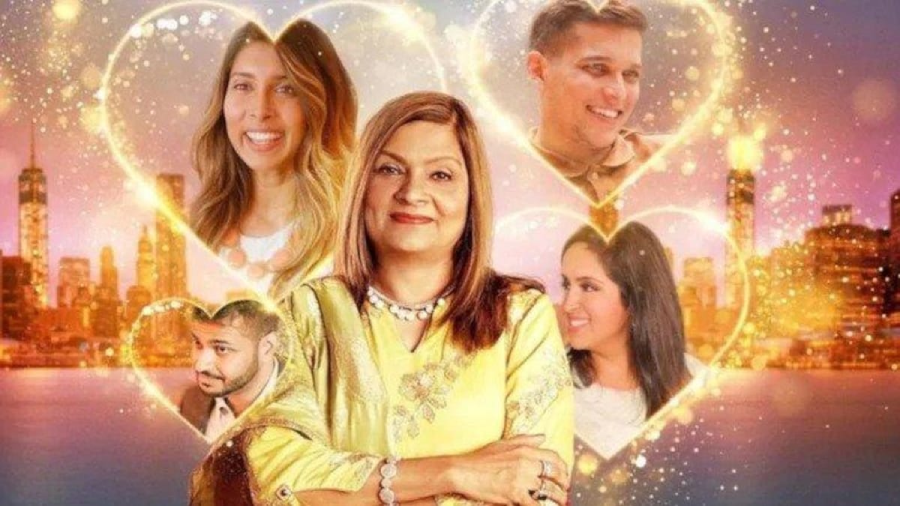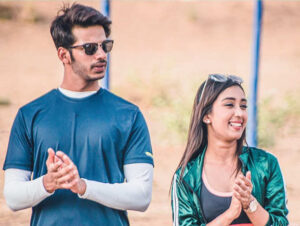The problem with romance on reality television

Sima Taparia became a 'meme queen' after 'Indian Matchmaking' for her zingy one-liners (Photo: Netflix)
Reality shows featuring blossoming love on television have been around since the early 2000s, with re-runs of originals like The Bachelor (2002) being broadcasted even today. Despite accusations of these programmes being scripted, audiences are often unable to tear their eyes away from the screen because they become invested in the carefully crafted stories and characters of participants.
This list presents a mixture of some recent hits and classic favourites from Indian reality television.
Splitsvilla
One of the most iconic reality shows on Indian television, Splitsvilla started airing on MTV India in 2008, and more than a decade later, continues to bring in strong viewership ratings in its 13th season. In the reality genre of Indian television, it ranks in the 99.5 percentile.
The show is similar to Love Island (2015) and features young, single boys and girls who are isolated from the rest of the world in a villa and compete in various tasks to be able to remain in the competition and develop a potential relationship.

Splitsvilla Season 12 winners, Shrey Mittal and Priyamvada Kant
Some of the disputes which have surrounded the show’s format are linked to accusations that the fights and “ideal matches” are heavily scripted, and that the excessive physical tasks can negatively influence youth. However, television critics say that regardless of controversies, audience demand is unrelentingly high for this genre of reality television.
“Honestly, it makes for great TV and like it or not, it also feeds the sensation-seeking, voyeuristic mind and its innate need to know about others’ lives. Another reason could be the other way of consuming content even though you have already set your mind about it- hate watching!” Sushri Sahu, an entertainment journalist, tells Media India Group.
Indian matchmaking
Released in July 2020, Netflix’s Indian Matchmaking, which describes itself as a documentary television series, immediately became infamous among not only Indians around the world, but even foreigners who perhaps finally got a chance to understand what arranged marriage is really like.
The show follows four “clients” spread across Delhi, Mumbai, San Diego and Houston as they go through a series of awkward dates with prospective matches and questionable face readers. Sima Taparia, the marriage consultant and star of the show, gained recognition for her frankness and amusing one-liners, which have also spurred countless internet memes and online games, such as “Marriages nowadays are like biscuits, they keep breaking” and “Indians are scared of bahus (daughter-in-laws) who are lawyers.”
“I watched it with my friends and it was really funny because some of the people we just couldn’t take seriously. But it was also quite shocking since, this does actually happen in real life. Even though I am still in the middle of doing my Master’s degree, I face a lot of pressure from my parents so in reality, they weren’t that far off with that aspect of it,” says Aperna Nair, an Indian-American college student.

Aparna Shewakramani, a Houston-based lawyer was criticised by Taparia as being too “negative”
The show has received heavy criticism for its lack of representation. Despite being called “Indian” matchmaking, it only focuses on one specific sector of India’s 1.4 billion population – wealthy and upper caste Hindus. In fact, the controversial subject of caste is conveniently hidden under terms like “similar backgrounds” and “shared communities”.
“I don’t think they should stop making these shows; I think they should acknowledge the huge responsibility that comes with knowing that shows as such can influence pop culture and therefore the young who live and breathe it. Packaging and messaging is key; just don’t glorify toxic relationships and we’ll be fine!” explains Sahu.
Kennith Rosario, a reviewer for the newspaper The Hindu, panned the show, saying the participants “believe in some of the most atavistic ideals of marriage, and the show, in its glossy demeanour, endorses it.”
What the Love
Another Netflix series, What the Love (2020) features Karan Johar as “Cupid” who attempts help six singles in their twenties find love. Johar, who is an eminent name in Indian cinema known for directing iconic love stories, seems to be the perfect candidate for the role, even asking contestants the notorious “What does love mean to you?” line from Kuch Kuch Hota Hai (1998). He manages to create a “somewhat believable and endearing personal narrative around each participant,” according to critic Surabhi Srivastava.

Karan Johar plays Cupid in Netflix original ‘What the Love’
Similar in some ways to the hugely popular American reality series Queer Eye (2018), an interesting feature of the programme that sets it apart from other dating shows is the dedicated makeover montage, both physical (makeup and hair) and mental (helping them identify their insecurities).
Another hugely appealing trait of What the Love is that as a result of the flexibility of an OTT platform, the show actually addresses harmful Indian stereotypes, showcasing and commenting on the issues of LBTQ couples in India as well as one episode in which a young doctor explains how her weight has been freely judged by all of her marriage prospects, a stark contrast to Indian Matchmaking, where “slim, trim, beautiful” is often considered to be the only acceptable standard.
Skulls and Roses
Described as a hybrid of Splitsvilla and the popular reality daredevil show Roadies, Skulls and Roses (2019) is an Amazon Prime production that features eight couples who embark on an adventurous journey between “Rose Island” in the Andamans and “Skull Island” in Knysna, South Africa. The main premise of the game is that contestants must choose between “trust, love, and survival” as their relationships are tested by gruelling tasks and dramatic discussions of elimination.

16 competitors take on a series of tough challenges
The judges or show runners are Rajiv Lakshman and Raghu Ram, the original creators of Roadies (2003). Lakshman and Ram spearheaded Roadies to huge success among the Indian youth, and it eventually became one of India’s longest running reality shows with a 17-year history. However, they did not manage to achieve the same level of success with Skulls and Roses, with an IMDB rating of 4.3/10 and critics largely panning the show and deeming it “mindless entertainment.”
In response to audience criticism of this flux in dating shows, Sahu believes that reality television should be treated as “car-crash TV,” as pure entertainment rather than any kind of educational viewing.
“I don’t think they are harmless. But I don’t think they are here to degenerate us either. If anything, it’s a reflection and amalgamation of things including the ever-changing dynamics of dating, social etiquettes and simple human behaviour really,” says Sahu.









